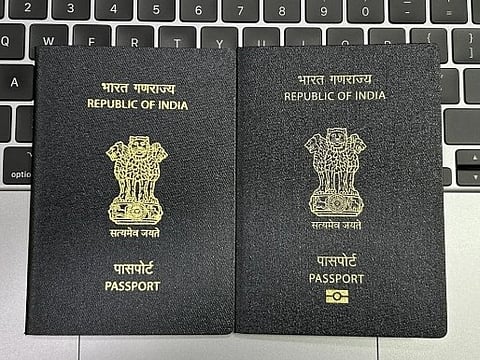Indian ePassport with chip in UAE: Should all Indian expats change their regular passports now?
Regular passport vs ePassport: Here are the differences, benefits and what is mandatory

Abu Dhabi/Dubai: Indian expats in the UAE now have access to chip-embedded ePassport through a new online portal, but the question on many minds is whether they should replace their existing passports with the new technology-enabled version.
The short answer: No, it is not mandatory. Your current traditional passport remains valid until expiration.
According to India’s Ministry of External Affairs (MEA), all passports issued by the Government of India will continue to remain valid till their expiry date.
“As and when a respective Passport Office is technically enabled for issuance of ePassport, the citizens applying under that passport office will get the ePassport,” the ministry has clarified.
India had launched a phase-wise roll-out of ePassport covering all Passport Offices across the country and in its missions abroad. The missions in the UAE started a pilot programme a while ago and are now ready to roll out the implementation, sources told Gulf News.
What makes ePassport different
An ePassport is a combined paper and electronic passport with a Radio Frequency Identification (RFID) chip and an antenna embedded as an inlay of the passport that contains the personal particulars and biometric information of the passport holder.
The ePassport will be visually identifiable as a small additional gold-colour symbol printed on the front cover of the passport, towards the bottom.
The passport numbering system has also changed in the ePassport. While existing passports follow the format of one letter followed by a seven-digit number, the ePassport number follows the format of two letters followed by a six-digit number.
What are the benefits?
The major benefit of the ePassport comes with an enhanced ability to maintain the integrity of the passport holder's data.
“The ePassport will have the data in printed form on the booklet, as well as digitally signed in the electronic chip, which can be securely authenticated by immigration officials globally; thus, safeguarding the passport from forgery, and potential fraudulent activities like fake passports, while confirming the genuineness at border controls,” the MEA stated.
Enhanced security features
The underlying technology supporting the security of the ePassport is the Public Key Infrastructure (PKI) solution, which is the foundation for safeguarding sensitive information and confirming the integrity and origin of the personal and biometric data stored on the chip within the ePassport.
This means smoother immigration clearances worldwide, as border control authorities can quickly verify the authenticity of your travel document through electronic scanning.
How to apply
Indian expats in the UAE can now apply for chip-embedded ePassports through a new online portal announced by the Indian Embassy in Abu Dhabi and the Indian Consulate in Dubai.
As first reported by Gulf News on Monday, all Indian passport applicants will have to use the new online portal for all passport-related services effective from today, October 28. The portal URL is https://mportal.passportindia.gov.in/gpsp/AuthNavigation/Login.
New application process
The upgraded Passport Seva Programme (GPSP 2.0) allows users to register on the portal by clicking the “Register” link, followed by logging in with their credentials. Applicants can then generate new applications from the Applicant Home Page and print the submitted form.
After online submission, users must book an appointment to visit any of the centres belonging to BLS International, the outsourced service provider for Indian passport and visa applications.
Appointments can be booked through https://indiavisa.blsinternational.com/uae/appointment/bls_appmnt/login.
Document requirements
Once the appointment is booked, applicants can visit their respective BLS International centre with the required supporting documents.
The missions said applicants will have the option to upload their International Civil Aviation Organisation (ICAO)-compliant photograph, signature, and supporting documents in the PSP portal.
“Applicants are encouraged to upload these documents in GPSP 2.0, which will reduce their waiting time at BLS Centres,” the missions pointed out.
The diplomatic missions have advised applicants to review ICAO-compliant photograph guidelines available on the Embassy of India website before uploading their documents.
Simplified corrections
The new system also addresses a common pain point for applicants. In cases of minor corrections in passport applications, users will no longer need to retype entire applications at BLS centres, the missions clarified.
“In the new system, the service provider has the option to correct the already filled-in/submitted applications at their end, without any additional charge,” the missions clarified.
Earlier this month, BLS International had issued an alert to Indian expats regarding updated passport photo guidelines, urging applicants to wear dark-coloured attire when visiting its centres for passport application services.
This followed the new passport application rule for Indian expats in the UAE, requiring photographs compliant with the International Civil Aviation Organisation (ICAO) standards, which came into effect from September 1. The ICAO is the global aviation body that sets biometric and identity benchmarks for travel documents worldwide.
Sign up for the Daily Briefing
Get the latest news and updates straight to your inbox

